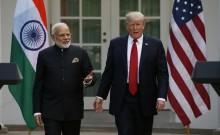
Russian opposition leader Alexey Navalny may have been exposed to "an unknown chemical substance" in prison, which triggered a major allergic reaction on Sunday, said his doctor Anastasia Vasilyeva.
"Some toxic agent may be the reason for Alexei Navalny's 'illness'," said Vasilyeva in a Facebook post. The physician also mentioned that officials at Moscow's hospital No 64 that treated him "behaved strangely".
While a doctor, Eldar Kazakhmedov, told Russian news agency Interfax that Navalny was suffering from an allergic reaction, Vasilyeva negated the claim.
She said that it was clear that Navalny was suffering from "the result of the harmful effects of undefined chemical substances". "We cannot exclude toxic damage to the skin by chemicals induced by a 'third person'," she wrote.
She also urged the hospital administration to immediately allow proper medical care for Navalny.
Two physicians, including Vasilyeva, visited Navalny on Sunday but were not allowed to examine him. She revealed that he had swollen eyelids, discharge in the eye as well as a rash on his upper body and appeared to be suffering from acute toxic conjunctivitis and dermatitis.
Apart from refusing to diagnose Navalny and informing his family about the cause, Vasilyeva noted that the hospital doctors were "visibly jittery".
His spokesperson Kira Yarmysh said on Sunday that the allergic reaction was something unlike any that he suffered before in his life.
However, Navalny was reported to be "in a satisfactory condition", a representative of the hospital told AFP on Monday.
Analysts said that the incident is alarming knowing how an opposition politician Boris Nemtsov was assassinated outside the Kremlin in 2015. Both Nemtsov and Navalny have openly criticised Russian President Vladimir Putin. Navalny is serving a 30-day sentence for organising an anti-government protest last week
Close to 1,400 protestors were detained for attending a mass protest after opposition candidates were barred from participating in Moscow city elections in September.
While most of the protestors were released without charge, according to The Guardian, more than 150 people were arrested and may face charges in court this week. Around 25 people were also reportedly injured, revealed an independent monitoring group.
















